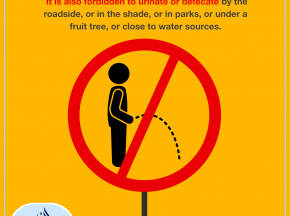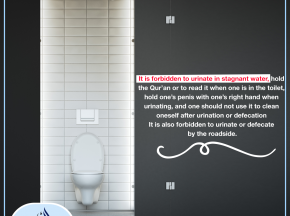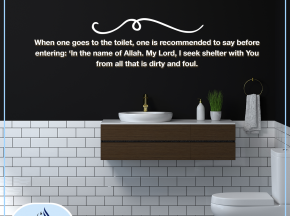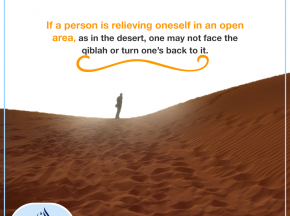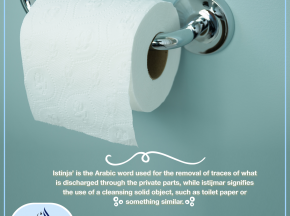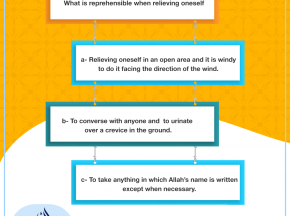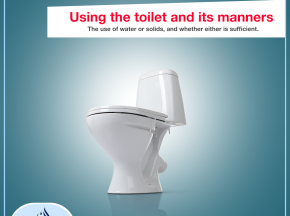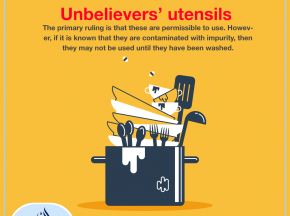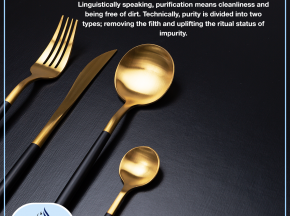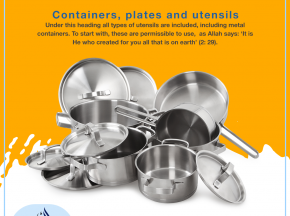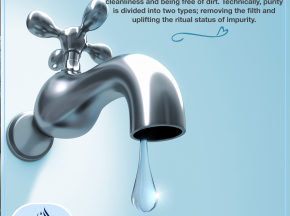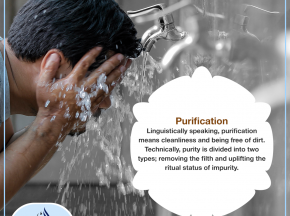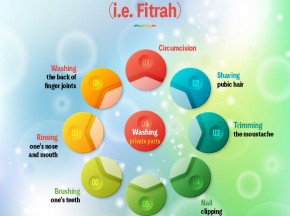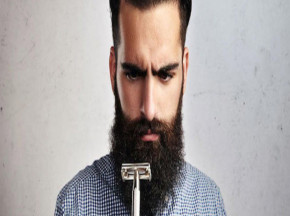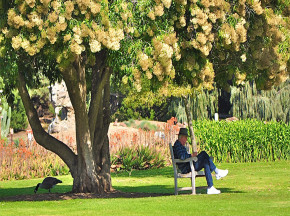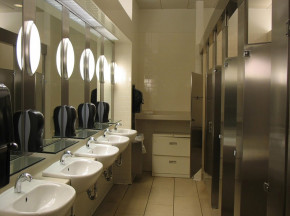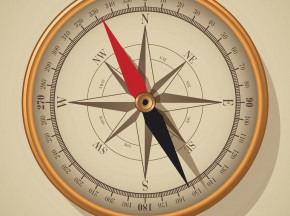content of level
Muslim bathroom etiquette - Part II
It is also forbidden to urinate or defecate by the roadside, or in the shade, or in parks, or under a fruit tree, or close to water sources.
Muslim bathroom etiquette
It is forbidden to urinate in stagnant water, hold the Qur’an or to read it when one is in the toilet, hold one’s penis with one’s right hand when urinating, and one should not use it to clean oneself after urination or defecation. It is also forbidden to urinate or defecate by the roadside.
Toilet Manners
When one goes to the toilet, one is recommended to say before entering: ‘In the name of Allah. My Lord, I seek shelter with You from all that is dirty and foul.
Relieving oneself in an open area
If a person is relieving oneself in an open area, as in the desert, one may not face the qiblah or turn one’s back to it.
Istinja and Istibra
Istinja’ is the Arabic word used for the removal of traces of what is discharged through the private parts, while istijmar signifies the use of a cleansing solid object, such as toilet paper or something similar.
What is reprehensible when relieving oneself
What is reprehensible when relieving oneself a- Relieving oneself in an open area and it is windy, to do it facing the direction of the wind. b- To converse with anyone and to urinate over a crevice in the ground. c- To take anything in which Allah’s name is written, except when necessary.
Using the toilet and its manners
The use of water or solids, and whether either is sufficient.
Unbelievers’ utensils
The primary ruling is that these are permissible to use. However, if it is known that they are contaminated with impurity, then they may not be used until they have been washed.
Utensils welded with gold or silver
If gold is used for welding a broken utensil, it becomes unlawful to use, but If a small amount of silver is used for welding, it is permissible to use.
Use of gold and silver articles in purification
The use of gold and silver articles for food and drink is forbidden.
Containers, plates and utensils
Under this heading all types of utensils are included, including metal containers. To start with, these are permissible to use, as Allah says: ‘It is He who created for you all that is on earth’ (2: 29).
The water used for purification
The water that ensures purification is called tahur, and it is defined as pure and purifying.
Purification
Linguistically speaking, purification means cleanliness and being free of dirt. Technically, purity is divided into two types; removing the filth and uplifting the ritual status of impurity.
Recommended practices of sound nature (i.e. fitrah)
Recommended practices of sound nature (i.e. fitrah): 1.Shaving pubic hair. 2.Circumcision. 3.Trimming the moustache. 4.Nail clipping. 5.Plucking the armpit. 6- Brushing one’s teeth. 7- Rinsing one’s nose and mouth. 8- Washing the back of finger joints. 9- Washing private parts.
Rules of Purification
Of the unique actions of worship that Allah (subḥānahu wa ta'āla) has blessed us with in exclusion of all previous Ummahs before us is the ritual of Wudu (ablution).
Recommended practices of sound nature
There are five practices also called ‘nature’s fine characteristics’ that each Muslim should perform to keep the best and most complete form. Practices and the reason behind them are explained in the article.
What is reprehensible when relieving oneself
Some acts are reprehensible when someone is relieving himself such as talking to anyone or to urinate over a crevice in the ground. It is also reprehensible to urinate facing wind direction if it is in an open area.
What is forbidden when relieving oneself
God has forbidden some acts when one relives himself like urinating or defecating in stagnant water, by roadsides or reading Quran in the toilet. This article clarifies all these acts and the reason behind each.
When going to the toilet
More than one hadith clarify what should be done when going to the toilet. Entering with the left foot and leaving with the right one is recommended, as well as saying some prayers and other points discussed below.
Facing the qiblah when relieving oneself
Facing the qiblah or turning one’s back to it in an open area when reliving oneself is prohibited. However, if the toilet is in a building or there is a screen between the person using it and the qiblah, one may use it.

